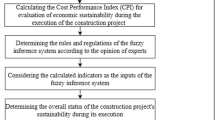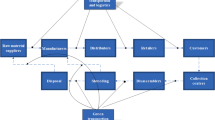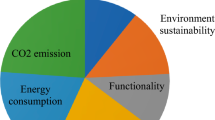Abstract
As a multi-disciplinary process, planning of public transportation systems needs special attention from several groups of stakeholders such as passengers, transportation planners, system providers, and so on. Since each stakeholder has dissimilar viewpoints on the evaluation of the public transportation systems, they have contradictory goal and objectives. In this sense, multi-criteria decision-making (MCDM) provides an important procedural outline for the evaluation of public transportation alternatives. This paper presents an application of MCDM method to assess the public transportation alternatives designed for a public university in a large-sized metropolitan area. Two alternatives of MCDM methods, named Interval-Valued Intuitionistic Fuzzy Analytical Hierarchy Process & COmbinative Distance-based Assessment (IVIF-AHP & CODAS), are integrated in the evaluation process. The proposed method ensures consistent and reasonable results and provides suggestions for the forthcoming progresses of public transportation service quality. In order to validate robustness of the proposed method, sensitivity analyses are implemented. Also, at the end of the study, to prove the superiority of the proposed approach, a comparative analysis is employed.





Similar content being viewed by others
References
Litman, T.: Evaluating Public Transit Benefits and Costs, Best Practices Guidebook. Victoria Transport Policy Institute, Victoria (2018)
Ekbatani, M., Cats, O.: Multi-Criteria Appraisal of multi-modal urban public transport systems. In: 18th Euro working group on transportation, EWGT 2015, 14–16 July 2015, Delft, The Netherlands (2015)
Zeynali, M., Aghdaie, M.H., Rezaeiniya, N., Zolfani, S.H.: A hybrid fuzzy multiple criteria decision making (MCDM) approach to combination of materials selection. Afr. J. Bus. Manage. 6(45), 11171–11178 (2012)
Hanine, M., Boutkhoum, O., Tikniouine, A., Agouti, T.: Application of an integrated multi-criteria decision making AHP-TOPSIS methodology for ETL software selection. SpringerPlus 5(1), 263 (2016)
Roy, J., Das, S., Kar, S., Pamučar, D.: An extension of the codas approach using interval-valued intuitionistic fuzzy set for sustainable material selection in construction projects with incomplete weight information. Symmetry 11(3), 393 (2019)
Ghorabaee, M., Zavadskas, E.K., Turskis, Z., Antucheviciene, J.: A new combinative distance-based assessment (CODAS) method for multi-criteria decision-making. Econ. Comput. Econ. Cybern. Stud. Res. 50(3), 25–44 (2016)
Wu, J., Huang, H.B., Cao, Q.W.: Research on AHP with interval-valued intuitionistic fuzzy sets and its application in multi-criteria decision making problems. Appl. Math. Model. 37(24), 9898–9906 (2013)
Aydin, N.: A fuzzy-based multi-dimensional and multi-period service quality evaluation outline for rail transit systems. Transp. Policy 55, 87–98 (2017)
Celik, E., Gül, M., Aydin, N., Gumus, A.T., Güneri, A.F.: A comprehensive review of multi criteria decision making approaches based on interval type-2 fuzzy sets. Knowl. Based Syst. 85, 329–341 (2015)
Talvitiie, A., Kronpraser, N., Kikuchi, S.: Transportation decision-making: comparison of hierarchical tree and reasoning map structures. In: 13th world conference 15–18 July 2013 (2013)
Jakimavicius, M., Burinskiene, M.: Assessment of Vilnius city development scenarios based on transport system modelling and multicriteria analysis. J. Civil Eng. Manag. 15(4), 361–368 (2009)
Jeon, C.M., Amekudzi, A.A., Guensler, R.L.: Evaluating plan alternatives for transportation system sustainability: atlanta metropolitan region. Int. J. Sustain. Transp. 4(4), 227–247 (2010)
Nijkamp, P., Borzacchiello, M.T., Ciuffo, B., Torrieri, F.: Sustainable urban land use and transportation planning: a cognitive decision support system for the Naples metropolitan area. Int. J. Sustain. Transp. 1(2), 91–114 (2007)
Keumi, C., Murakami, H.: The role of schedule delays on passengers’ choice of access modes: a case study of japan’s international hub airports. Transp. Res. Part E 48, 1023–1031 (2012)
Zak, J.: The methodology of multiple criteria decision making/aiding in public transportation. J. Adv. Transp. 45, 1–20 (2011)
Aydin, N., Celik, E., Gumus, A.T.: A hierarchical customer satisfaction framework for evaluating rail transit systems of Istanbul. Transp. Res. Part A Policy Pract. 77, 61–81 (2015)
Liou, J.J.H., Hsu, C.-C., Chen, Y.-S.: Improving transportation service quality based on information fusion. Transp. Res. Part A Policy Pract. 67, 225–239 (2014)
DeBoer, E.: The dynamics of school location and school transportation. TR News 237, 11–16 (2005)
Ettema, D., Arentze, T., Timmermans, H.: Social influences on household location, mobility and activity choice in integrated micro-simulation models. Transp. Res. Part A 45(2011), 283–295 (2011)
Pabayo, R., Gauvin, L.: Proportions of students who use various modes of transportation to and from school in a representative population-based sample of children and adolescents. Prev. Med. 46, 63–66 (2008)
DiGuiseppi, C., Roberts, I., Li, L., Allen, D.: Determinants of car travel on dailiy journeys to school: cross sectional survey of primary school children. BMJ 316(7142), 1426–1428 (1998)
Ipingbemi, O., Aiworo, A.B.: Journey to school, safety and security of school children in Benin City, Nigeria. Transp. Res. Part F n 19, 77–84 (2013)
Eboli, L., Mazzulla, G.: An ordinal logistic regression model for analysing airport passenger satisfaction. EuroMed J. Bus. 4(1), 40–57 (2009)
Zheng, L., Jiaqing, W.: Summary of the application effect of bus rapid transit at beijing south-centre corridor of China. J. Transp. Syst. Eng. Inf. Technol. 7(4), 137–142 (2007)
Teng, J.Y., Tzeng, G.H.: Transportation investment project selection using fuzzy multiobjective programming. Fuzzy Sets Syst. 96(3), 259–280 (1998)
Soltani, A., Marandi, E., Ivaki, Y.: Bus route evaluation using a two-stage hybrid model of Fuzzy AHP and TOPSIS. J. Transp. Lit. 7(3), 34–58 (2013)
Arslan, T.: A hybrid model of fuzzy and AHP for handling public assessments on transportation projects. Transportation 36, 97–112 (2009). https://doi.org/10.1007/s11116-008-9181-9
Hanaoka, S., Kunadhamraks, P.: Multiple criteria and fuzzy based evaluation of logistics performance for intermodal transportation. J. Adv. Transp. 43(2), 123–153 (2009)
Celik, E., Aydin, N., Gumus, A.T.: A multiattribute customer satisfaction evaluation approach for rail transit network: a real case study for Istanbul, Turkey. Transp. Policy 36, 283–293 (2014)
Hassan, M.N., Hawas, Y.E., Ahmed, K.: A multi-dimensional framework for evaluating the transit service performance. Transp. Res. Part A Policy Pract. 50, 47–61 (2013)
Kundu, P., Kar, S., Maiti, M.: A fuzzy MCDM method and an application to solid (2014)
Zak, J.: The methodology of multiple criteria decision making/aiding in public transportation. J. Adv. Transp. 45(1), 1–20 (2011)
Antony, R.J.P., Savarimuthu, S.J., Pathinathan, T.: Method for solving the transportation problem using triangular intuitionistic fuzzy numbers. Int. J. Comput. Alg 03, 590–605 (2014)
Singh, S.K., Yadav, S.P.: A new approach for solving intuitionistic fuzzy transportation problem of type-2. Ann. Oper. Res. 243, 1–15 (2014)
Hussien, M.L.: Complete solution of multiple objective transportation problems with possibilistic coefficients. Fuzzy Sets Syst. 93(3), 293–299 (1998)
Bharati, S.K., Singh, S.R.: Transportation problem under interval-valued intuitionistic fuzzy environment. Int. J. Fuzzy Syst. 20(5), 1511–1522 (2018)
Kour, D., Basu, K.: Selection of transportation companies and their mode of transportation for interval valued data. Neutropsophic Sets Syst. 18, 67–79 (2017)
Mihyeon Jeon, C., Amekudzi, A.: Addressing sustainability in transportation systems: definitions, indicators, and metrics. J. Infrastruct. Syst. 11(1), 31–50 (2005)
Awasthi, A., Chauhan, S.S., Omrani, H.: Application of fuzzy TOPSIS in evaluating sustainable transportation systems. Expert Syst. Appl. 38(10), 12270–12280 (2011)
Shiau, T.A.: Evaluating sustainable transport strategies with incomplete information for Taipei City. Transp. Res. Part D Transp. Environ. 17(6), 427–432 (2012)
Bolturk, E., Kahraman, C.: Interval-valued intuitionistic fuzzy CODAS method and its application to wave energy facility location selection problem. J. Intell. Fuzzy Syst. 35, 4865–4877 (2018)
Yeni, F.B., Özçelik, G.: Interval-valued Atanassov intuitionistic Fuzzy CODAS method for multi criteria group decision making problems. Group Decis. Negot. 28(2), 433–452 (2019)
Seker, S.: A novel interval-valued intuitionistic trapezoidal fuzzy combinative distance-based assessment (CODAS) method. Soft Comput. 1–14 (2019)
Atanassov, K.: Intuitionistic fuzzy sets. Fuzzy Sets Syst. 20(1), 87–96 (1986)
Atanassov, K., Gargov, G.: Interval-valued intuitionistic fuzzy sets. Fuzzy Sets Syst. 31(3), 343–349 (1989)
Zavadskas, E., Antucheviciene, J., Hajiagha, S., Hashemi, S.: Extension of weighted aggregated sum product assessment with interval-valued intuitionistic fuzzy numbers (WASPAS-IVIF). Appl. Soft Comput. 24(2014), 1013–1021 (2014)
Grzegorzewski, P.: Distances between intuitionistic fuzzy sets and/or interval-valued fuzzy sets based on the Hausdor & metric. Fuzzy Sets Syst. 148(2004), 319–328 (2004)
Xu, Z.S.: Methods for aggregating interval-valued intuitionistic fuzzy information and their application to decision making. Control Decis. 22(2), 215–219 (2007)
Saaty, T.L.: The Analytic Hierarchy Process. McGrawHill, New York (1980)
Ghorabaee, M., Amiri, M., Zavadskas, E.K., Hooshmand, R., Antuchevicienė, J.: Fuzzy extension of the CODAS method for multi-criteria market segment evaluation. J. Bus. Econ. Manag. 18(1), 1–19 (2017)
Manoj, M., Sahu, S.: Comparison of new multi-criteria decision making methods for material handling equipment selection. Manag. Sci. Lett. 8, 139–150 (2018)
Author information
Authors and Affiliations
Contributions
SS involved in methodology discussion and analysis. NA participated in content planning, sensitivity analysis, and manuscript writing and editing.
Corresponding author
Ethics declarations
Conflict of Interests
On behalf of all authors, the corresponding author states that there is no conflict of interest.
Rights and permissions
About this article
Cite this article
Seker, S., Aydin, N. Sustainable Public Transportation System Evaluation: A Novel Two-Stage Hybrid Method Based on IVIF-AHP and CODAS. Int. J. Fuzzy Syst. 22, 257–272 (2020). https://doi.org/10.1007/s40815-019-00785-w
Received:
Revised:
Accepted:
Published:
Issue Date:
DOI: https://doi.org/10.1007/s40815-019-00785-w




